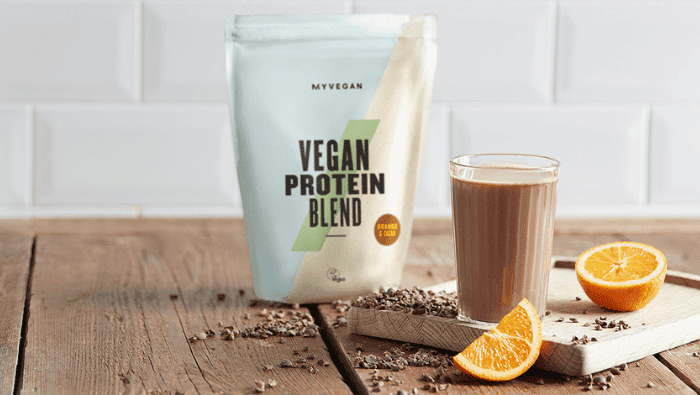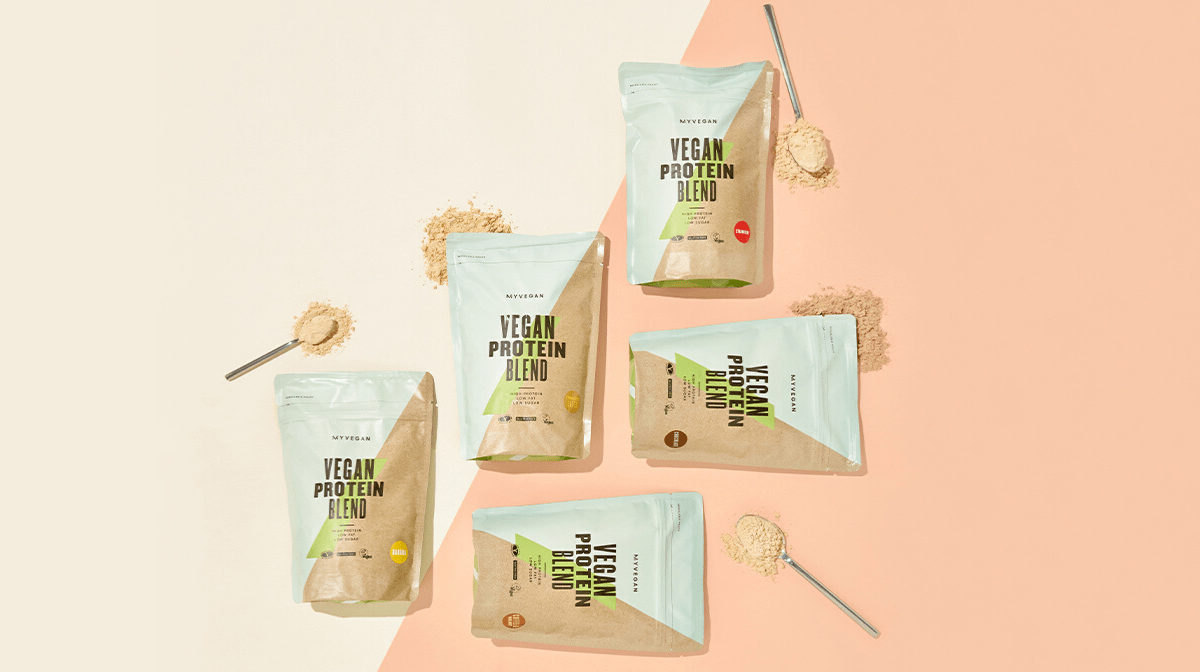
One of the most popular myths surrounding plant-based diets is the lack of availability of plant protein. As the popularity of plant-based diets increases, so has the demand for vegan protein sources.Plant-based proteins not only support muscle growth but have other associated benefits which make them an important part of a balanced diet and healthy lifestyle.
Before we look at some of the key benefits of plant protein, it’s important to understand what it is.
What is Plant Protein?
All protein, including protein from plant-based sources, is made up of “building blocks” called amino acids. There are 20 principle amino acids, 9 of which are known as essential amino acids, meaning we must consume them in our diet as we cannot synthesise them ourselves.
Protein is an essential part of any healthy diet as it plays a crucial role in the formation of tissues in the body including muscle, skin and tendons. Protein is also needed for normal physiological processes such as metabolism, as protein supports the formation of substances such as enzymes and hormones.
Plant protein means any dietary protein that is originally sourced from plants, such as quinoa, lentils, beans, seeds, nuts, and peas. Not all foods contain equal amounts of protein – different sources contain varying levels of each amino acid. One of the benefits of a varied diet is that it increases the likelihood of consuming all the 9 essential amino acids we need in our diet.
Vegan protein powders harness the power of plants by sourcing the different amino acids from plant-based sources and converting them into a convenient single-source powder. This can be useful for those that want to easily increase their protein intake, such as those meeting specific fitness goals.
Plant Protein vs. Animal Protein: What are the differences?
Whilst protein is often heavily associated with animal-based products, all essential amino acids can also be obtained from plant-based sources.1 Here are some of the most common differences between plant-based and animal protein sources:
Plant based proteins are not ‘complete sources’ of amino acids: Many meat sources contain the full 9 essential amino acids. However, you can still obtain all 9 amino acids from a plant protein when you consume varied sources.
Plant based proteins have greater health benefits: Unlike meat sources of protein,which have commonly been linked to developing health problems such as cardiovascular disease (9), plant-based proteins a
Plant based proteins are better for the environment: We all know that animal proteins are often associated with a high carbon footprint, plant-based sources are more sustainable and better for the environment.
5 benefits of plant protein
1. Muscle growth and repair
Muscle is made up of two types of filaments called actin and myosin which are both proteins. For protein to be created, it requires the “building blocks” known as amino acids. We produce some of these naturally (non-essential amino acids) and consume others through our diet (essential amino acids). For the body to repair muscle damaged by physical activity, and to create new muscle, it must have enough of the different amino acids needed to form the proteins in muscle tissue.
A little bit about leucine
Leucine is one of the 9 essential amino acids and is crucial to muscle growth and repair as it ‘switches on’ the process of protein synthesis.2 When levels of leucine reach a certain threshold, it triggers an enzyme called mTor which acts as the signal needed to start protein synthesis. Without the activation of this enzyme by the amino acid leucine, protein synthesis won’t occur.
Consuming protein from plant-based sources provides us with the necessary amino acids to support muscle growth and repair. Different plants, however, contain differing levels of each amino acid, so it’s important to consume protein from various plant-based sources to ensure you are providing your body with the full range of amino acids.
2. Plant protein sources contain essential micronutrients
Vegan protein sources such as fruit, vegetables, nuts, and seeds, are packed with a wide variety of micronutrients which are vital for our health and wellbeing. Recent scientific reviews have indicated how plant-based diets are associated with improved heart health and blood sugar management, lower overall mortality, reduced risk of obesity and hypertension, as well as supporting weight management.3,4,5,6 For example, one study suggests that swapping red meat for more vegetables results in significant improvements in levels of key indicators in people with Type 2 Diabetes.3
The benefit of consuming plant protein as a whole food means you also introduce vitamins, minerals, and phytochemicals into the diet, and these are what contribute to many of the additional health benefits.3,5 For example, edamame beans are one of the best vegan sources of protein, but also contain micronutrients such as iron, magnesium and Vitamin C, which help to reduce tiredness and fatigue.

3.
Plant proteins are environmentally friendly:
Plant-based proteins are not only beneficial for your health, but can also have a significantly positive impact on the world we live in. Vegan protein sources typically use less land, less water, and produce fewer greenhouse gas emissions during production compared to animal-based proteins. For example, producing 1kg of protein from kidney beans requires 18x less land, 10x less water, 9x less fuel, 12x less fertiliser, and 10x less pesticide than it does to produce 1kg beef protein.5
Environmental resources such as land and water are used to produce protein-rich plants to feed livestock, leading to animals bred for consumption acting as unnecessary ‘middle-men’. Instead, it is far more sustainable to consume plant-based protein directly from plants, as this prevents expansion of pastureland into natural forests and savannas.6
Related article:6 Ways Veganism Helps the Environment
4. Plant proteins contain fibre
Plant-based protein sources not only have the benefits of providing essential amino acids and micronutrients, but also contain the important macronutrient fibre. Dietary fibre, also known as roughage, is a type of carbohydrate that is found in all plants. Any plant-based food source, from fruits and vegetables to the numerous varieties of wholegrains, contains fibre. It is important to eat enough fibre daily as it is known to support digestive health and reduce the risk of gut inflammation.
Plant proteins have many health benefits:
Lots of new and emerging research has shown that plant proteins have numerous benefits including weight loss, lower cholesterol and managing blood sugar (7). This is because plant proteins are an important source of fibres and micronutrients which contribute to amazing health benefits.

Sources of Plant Protein:
Some of the most popular and beneficial sources of plant proteins include:
Tofu
Tempeh
Edamame
Seitan
Lentils
Beans
Nutritional yeast
Hemp seeds
Green beans
Soy milk
Oats
Summary
Plant-based protein sources are suitable for everybody including athletes, children, seniors and pregnant women.5 Not only can consuming plant protein be more beneficial to the environment but it also a great way to increase levels of essential amino acids, fibre, and micronutrients in your diet. Plant protein sources are often lower in calories and fat than animal-based ones, as well as being higher in fibre and micronutrients. This means consuming plant-based protein within a healthy, balanced diet can be beneficial for weight loss as it helps to reduce caloric intake and increase the daily nutrient profile in one’s diet. Whether you are working towards specific fitness goals or just want to improve your overall health, the benefits of plant protein can help you to achieve this.

6 Ways To Use Impact Vegan Protein
Sticking it in a shaker is only the beginning.

11 Plant-Based Proteins & Blends — Get The Full Scoop
Looking for an easy way to boost your plant-based diet?
- Young VR, Pellett PL. Plant proteins in relation to human protein and amino acid nutrition. Am J Clin Nutr. 1994;59:1203S–1212S.
- Breen L, et al. Leucine: a nutrient ‘trigger’ for muscle anabolism, but what more? J Physiol. 2012; 590(9):2065-6.
- Ahnen RT, et al. Role of plant protein in nutrition, wellness, and health. Nutr Rev. 2019. Jul 19.
- Hever & Cronise. Plant-based nutrition for healthcare professionals: implementing diet as a primary modality in the prevention and treatment of chronic disease. J Geriatr Cardiol. 2017. 14(5): 355-368.
- Melina V, et al. Position of the Academy of Nutrition and Dietetics: Vegetarian Diets. J Acad Nutr Diet. 2016; 116(12):1970-80.
- Ranganathan J, et al. Shifting diets for a sustainable food future. World Resource Institute. 2016. http://www.wri.org/publication/shifting-diets
- Plant Proteins: Assessing Their Nutritional Quality and Effects on Health and Physical Function – PMC (nih.gov)
- Protein foods from animal sources, incident cardiovascular disease and all-cause mortality: a substitution analysis – PMC (nih.gov)

Arabella has a Bachelor of Science degree in Physiology from the University of Glasgow where she covered health topics ranging from the physiological effects of exercise and nutrition, to psychology and neuroscience.
She has a lifelong interest in sport and fitness, including running, swimming, hockey, and especially rowing. At university, Arabella was a keen rower and competed in the first boat at events such as the prestigious Henley Women’s Regatta, The Scottish Boat Race, and British University Championships, and won Novice Rower of the year in her first year.
In her spare time, Arabella loves to train in the gym and practice yoga and meditation. She is passionate about the natural world and will take any opportunity to be outdoors.
Find out more about Arabella’s experience here.
Related Articles








